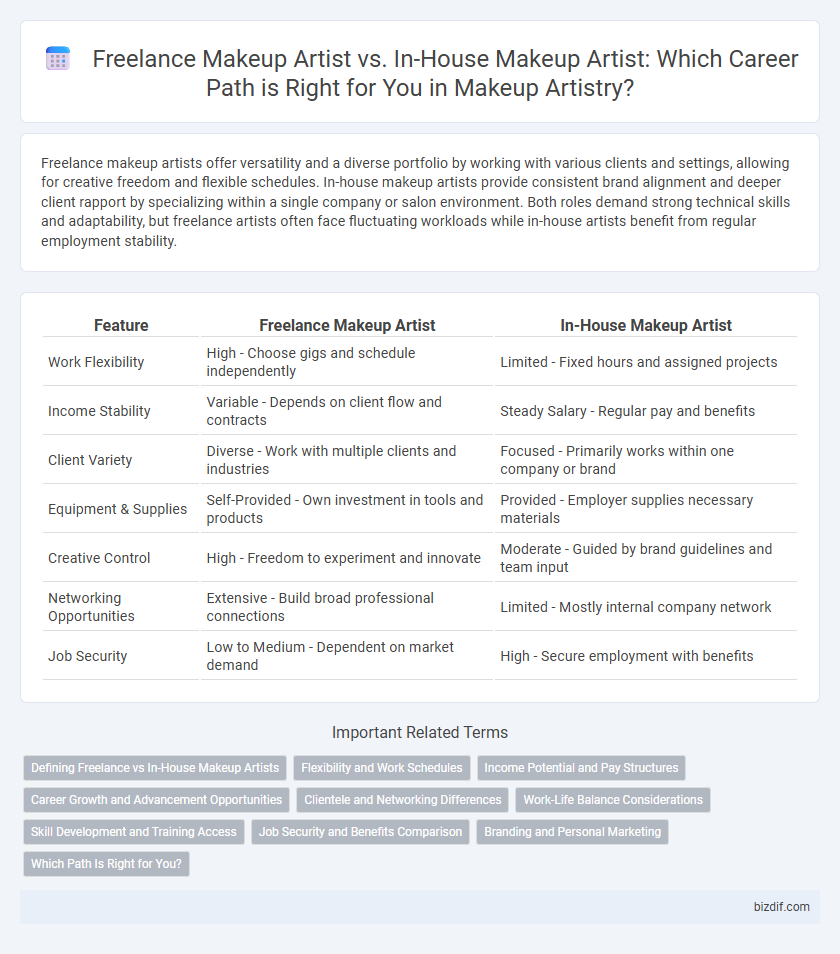Freelance makeup artists offer versatility and a diverse portfolio by working with various clients and settings, allowing for creative freedom and flexible schedules. In-house makeup artists provide consistent brand alignment and deeper client rapport by specializing within a single company or salon environment. Both roles demand strong technical skills and adaptability, but freelance artists often face fluctuating workloads while in-house artists benefit from regular employment stability.
Table of Comparison
| Feature | Freelance Makeup Artist | In-House Makeup Artist |
|---|---|---|
| Work Flexibility | High - Choose gigs and schedule independently | Limited - Fixed hours and assigned projects |
| Income Stability | Variable - Depends on client flow and contracts | Steady Salary - Regular pay and benefits |
| Client Variety | Diverse - Work with multiple clients and industries | Focused - Primarily works within one company or brand |
| Equipment & Supplies | Self-Provided - Own investment in tools and products | Provided - Employer supplies necessary materials |
| Creative Control | High - Freedom to experiment and innovate | Moderate - Guided by brand guidelines and team input |
| Networking Opportunities | Extensive - Build broad professional connections | Limited - Mostly internal company network |
| Job Security | Low to Medium - Dependent on market demand | High - Secure employment with benefits |
Defining Freelance vs In-House Makeup Artists
Freelance makeup artists operate independently, offering personalized services to a diverse clientele across various locations and events, which provides flexibility in scheduling and project variety. In-house makeup artists are typically employed by salons, fashion houses, or entertainment companies, working on-site with a consistent client base and brand standards. The key difference lies in employment structure, with freelance artists managing their own business operations, while in-house artists focus on specialized roles within an organization.
Flexibility and Work Schedules
Freelance makeup artists enjoy greater flexibility, allowing them to choose projects, set their own hours, and adapt to varying client needs, which supports diverse work schedules. In-house makeup artists typically adhere to fixed hours and structured routines dictated by the employer, offering consistency but less scheduling freedom. This distinction directly impacts work-life balance and availability for clients, making flexibility a key consideration in choosing between freelance and in-house roles.
Income Potential and Pay Structures
Freelance makeup artists typically have a variable income potential, earning based on rates they set per project or client, allowing for higher earnings during peak seasons but less stability overall. In-house makeup artists receive a fixed salary with benefits, providing consistent pay but often with a capped income ceiling. The choice between freelance and in-house roles affects financial growth, with freelancers able to scale incomes by expanding client bases while in-house artists benefit from steady pay and job security.
Career Growth and Advancement Opportunities
Freelance makeup artists often experience accelerated career growth through diverse client exposure, portfolio expansion, and networking across various industries, enhancing their marketability and skill set. In-house makeup artists benefit from structured advancement paths, specialized training, and consistent collaboration within a brand or organization, fostering steady professional development. Both career paths offer unique opportunities for skill enhancement, but freelancers typically gain broader experience while in-house artists enjoy stability and access to formal career advancement programs.
Clientele and Networking Differences
Freelance makeup artists often cultivate a diverse clientele by working across multiple venues, events, and industries, allowing for extensive networking opportunities and personalized client relationships. In-house makeup artists typically serve a consistent, brand-specific clientele, focusing on building deeper connections within a defined company or studio environment. The difference in clientele breadth influences networking strategies, with freelancers relying heavily on social media and industry events, while in-house artists benefit from internal referrals and company-driven projects.
Work-Life Balance Considerations
Freelance makeup artists enjoy flexible schedules that allow for better control over personal time and the ability to choose projects, enhancing work-life balance. In-house makeup artists often face fixed hours and consistent workloads, which can lead to less flexibility but more stability and steady income. Balancing creative freedom with job security is crucial when comparing work-life balance in these roles within the makeup artistry industry.
Skill Development and Training Access
Freelance makeup artists often gain diverse skill sets by working with a variety of clients, styles, and environments, which accelerates their adaptability and creativity. In-house makeup artists typically have access to continuous professional training and resources provided by the company or brand, allowing for specialized skill enhancement and updated industry techniques. Both paths demand ongoing education, but freelancers rely more on self-driven learning, workshops, and networking, while in-house artists benefit from structured training programs and mentorship opportunities.
Job Security and Benefits Comparison
Freelance makeup artists experience variable job security due to irregular client bookings, while in-house makeup artists benefit from consistent employment and steady income through salaried positions at salons or studios. In-house roles often include benefits such as health insurance, paid leave, and retirement plans, which freelance artists must independently secure. Freelancers gain flexibility and diverse opportunities but face challenges in accessing traditional employee benefits and maintaining financial stability.
Branding and Personal Marketing
Freelance makeup artists build their brand through personalized marketing strategies, leveraging social media platforms and client testimonials to establish a distinct identity and attract diverse clientele. In-house makeup artists benefit from the studio or company's established brand, but often have limited opportunities to independently market themselves beyond the employer's reputation. Strong personal branding enables freelancers to differentiate their services and secure higher-profile projects, while in-house artists rely more on internal promotion and company-driven opportunities.
Which Path Is Right for You?
Choosing between a freelance makeup artist and an in-house makeup artist depends on your career goals, flexibility, and preferred work environment. Freelance makeup artists enjoy diverse projects and autonomy, often requiring strong self-promotion and client management skills. In-house makeup artists benefit from consistent income and team collaboration, usually thriving in structured settings like salons or studios.
Freelance Makeup Artist vs In-House Makeup Artist Infographic

 bizdif.com
bizdif.com